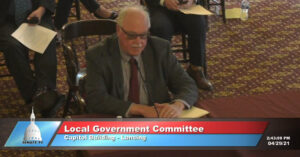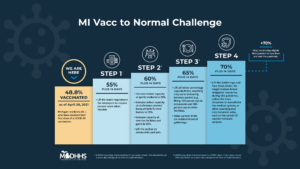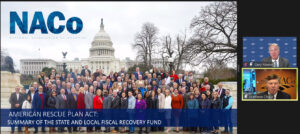Bills for 4-year terms in advance in Senate
 The Senate Local Government Committee advanced legislation to enact four-year terms for county commissioners at a Thursday hearing where Allegan County Commissioner Jim Storey and Dickinson County’s Joe Stevens testified in support of the bills.
The Senate Local Government Committee advanced legislation to enact four-year terms for county commissioners at a Thursday hearing where Allegan County Commissioner Jim Storey and Dickinson County’s Joe Stevens testified in support of the bills.
Senate Bill 242, by Sen. Ed McBroom (R-Dickinson), and SB 245, by Sen. Jeremy Moss (D-Oakland) would bring four-year terms to Michigan in the 2024 presidential election cycle. Enactment of these bills would end Michigan’s status as one of just five states with two-year terms on all commissioners.
In his testimony, Storey said, “In short, county commissioners are responsible for overseeing county governments whose job is service delivery, every day of every week of every month of every year. Being distracted from this service delivery, not legislative, function by short elected terms disserves the residents we share.”
The bills now move to the Senate floor.
MAC continues to encourage commissioners to add their voices to the four-year term effort. As of Thursday afternoon, 54 county leaders had responded. Please add your voice to this effort today by clicking here.
MAC also requests that counties adopt official resolutions of support for the legislation. To download a template for this purpose, click here.
As of Thursday, the following counties had advised MAC of passage of such resolutions: Genesee, Cheboygan, Bay, Ionia, Manistee, Van Buren, Clinton, Houghton, Marquette, Allegan, Newaygo, Emmet, Ontonagon and Wexford. If your county passes a resolution, please send a copy to Hannah Sweeney at sweeney@micounties.org.
For more information on this issue, contact Deena Bosworth at bosworth@micounties.org.
Governor announces COVID reopening benchmarks
 Michigan’s COVID restrictions would recede as the state hits various vaccination benchmarks under a plan unveiled by Gov. Gretchen Whitmer on Thursday.
Michigan’s COVID restrictions would recede as the state hits various vaccination benchmarks under a plan unveiled by Gov. Gretchen Whitmer on Thursday.
Her “MI Vacc to Normal” plan has four phases tied to statewide vaccination rates, with provisions kicking in two weeks after the benchmark is hit:
- 55% of Michiganders (4,453,304 residents) — allows in-person work for all sectors of business.
- 60% of Michiganders (4,858,150 residents) — increases indoor capacity at variety of venues and lifts curfew on restaurants and bars
- 65% of Michiganders (5,262,996 residents) — lifts all indoor % capacity limits, requiring only social distancing between parties and further relaxes limits on residential social gatherings.
- 70% of Michiganders (5,667,842 residents) — lifts the Gatherings and Face Masks Order such that MDHHS will no longer employ broad mitigation measures, unless unanticipated circumstances arise, such as the spread of vaccine-resistant variants
“The MI Vacc to Normal challenge outlines steps we can take to emerge from this pandemic as we hit our vaccination targets together,” said Governor Gretchen Whitmer. “On our path to vaccinating 70% of Michiganders 16 and up, we can take steps to gradually get back to normal while keeping people safe. “
For the latest information on COVID, visit MAC’s COVID Resources Page.
Legislative Conference highlights 4-year terms, federal COVID aid
 The top official in the Michigan House of Representatives signaled support for four-year county commissioner terms and critical federal guidance on how to spend $1.9 billion in COVID aid for Michigan counties is expected as early as next week were two of the highlights of the 2021 Michigan Counties Legislative Conference this week.
The top official in the Michigan House of Representatives signaled support for four-year county commissioner terms and critical federal guidance on how to spend $1.9 billion in COVID aid for Michigan counties is expected as early as next week were two of the highlights of the 2021 Michigan Counties Legislative Conference this week.
The gathering, held virtually for the second consecutive year, featured three plenary sessions plus more than a dozen workshops for MAC members and members of the Michigan County Medical Care Facilities Council (MCMCFC).
House Speaker Jason Wentworth (R-Clare), speaking during a recorded Legislative Roundtable, said he would support four-year terms for county commissioners. Legislation to enact such terms are now in the Michigan Senate and are a MAC legislative priority for 2021.
During a Thursday plenary session, Matt Chase, executive director of the National Association of Counties (NACo), said the U.S. Treasury may release guidance as early as next week on how counties can spend direct investments from the federal American Rescue Plan (ARP). Chase and NACo President Judge Gary Moore of Boone County, Ky., urged counties to be sure to have all of their technical requirements fulfilled to receive their first allotment of ARP funds.
Following Chase and Moore, MAC Executive Director Stephan Currie introduced the first graduating class of MAC’s County Commissioner Academy. Members are:
| Mary Ellen Babcock, Huron County | Teri Freehling, Berrien County |
| Vaughn Begick, Bay County | Bryan Kolk, Newaygo County |
| Ed Boettcher, Antrim County | Charles MacInnis, Emmet County |
| Joe Bonovetz, Gogebic County | Roseann Marchetti, Cass County |
| Mike Chappell, Van Buren County | William Miller, Oakland County |
| Toni Drier, Emmet County |
Currie also announced at the conference that MAC plans to return to in-person events with the 2021 Regional Summits in late July and the 2021 Annual Conference Sept. 26-28 on Mackinac Island.
Watch for registration alerts for these events starting in early June.
Supplemental budget bill spending $3.5 billion goes to full House
 An FY21 supplemental budget bill, House Bill 4420, by Rep. Thomas Albert (R-Kent), passed out of the House Appropriations Committee this week, allocating $2.5 billion in federal COVID relief funds and $992.3 million from the state’s General Fund. Included in that amount are:
An FY21 supplemental budget bill, House Bill 4420, by Rep. Thomas Albert (R-Kent), passed out of the House Appropriations Committee this week, allocating $2.5 billion in federal COVID relief funds and $992.3 million from the state’s General Fund. Included in that amount are:
- $25 million for PFAS remediation grants, $15 million of which is for municipal airports
- $40 million for high-water infrastructure grants to plan for severe weather impact and grants to address flooding, erosion and other coastal issues
- $300 million for the local road and bridge fund
- $400 million in return-to-work grants, which is for $1,000 each per person who returns to work and leaves the unemployment system
- $100 million in nursing facility grants to provide a $20 per Medicaid day increase to facilities that have experienced a decline in their average daily census
- $100 million for grants to increase the number of long-term pediatric psychiatric inpatient facilities ($85 million for a new Hawthorn center; $15 million for mental health care improvements in emergency rooms
- $19.8 million to meet new requirements of the federal Family First Prevention Services Act
- $6.5 million for Certified Community Behavioral Health Clinics Demonstration Program
- $7.5 million to support public access, through a website, to documents and digital images of documents filed in courts
The bill will be up for consideration in the full House next week. If approved, it would move to the Senate.
For questions on this issue, contact Deena Bosworth at bosworth@micounties.org.
MAC-opposed court mandates bill advances

Despite opposition from MAC, the Michigan Association of County Clerks and other stakeholders, House Bill 4164, by Rep. Ryan Berman (R-Oakland), passed the House 61-49 this week. The bill would require a court to allow the public to access, through a website, the register of documents and digital images of documents filed in that court by Jan. 1, 2023.
Currently, the state, through the State Court Administrative Office (SCAO), is moving toward a MiFILE system for electronic filings, but it is not expected to be done by 2023. In fact, the soonest SCAO has said it could be done, if funded properly, is 2025. The House supplemental funding plan does include $7.5 million toward this effort, but that bill is not finalized. Nor does HB 4164 ensure any local court costs are covered by the state, rather than their local funding unit.
The bill now moves to the Senate Judiciary and Public Safety Committee, chaired by Sen. Roger Victory (R-Ottawa). MAC urges members to use our Advocacy Center to reach out to your senators and also rally opposition from your county clerks, chief judges and their staffs.
For questions, please contact Meghann Keit-Corrion at keit@micounties.org.
Legislation to waive food safety fees advances in Senate
 Legislation that would impair funding for local health departments to ensure safe food establishments cleared the Senate Regulatory Reform Committee this week, despite opposition from MAC and the Michigan Association of Local Public Health.
Legislation that would impair funding for local health departments to ensure safe food establishments cleared the Senate Regulatory Reform Committee this week, despite opposition from MAC and the Michigan Association of Local Public Health.
Senate Bills 353-54, by Sen. Curt VanderWall (R-Benzie), would waive annual state and local licensing and application fees for food establishments from May 1, 2021, to April 2022.
MAC raised concern with the introduced version that waived the fees that are due by April 30, arguing most business owners would have already paid these fees by the time this legislation passed. MAC offered solutions in which restaurants could seek reimbursements through the state, while holding local health departments harmless, however the solution was not accepted.
Under the committee-passed version, to the extent that the Department of Agriculture and Rural Development (MDARD) or a local health department had charged and collected a license fee for a food service establishment license that was valid for the above license year, MDARD or the local health department would have to refund the license fee.
MAC strongly opposes as food service license fees cover 50 percent to 75 percent of the cost of food safety activities at the local level. While some counties may choose to waive the local fee, they do so because their budget can sustain it and they can replace the lost revenue. Others may not be so fortunate and should not be told by the state how to control their county budgets.
In a time when our county public health officials and staff have been under so much pressure responding to COVID, while continuing to manage a host of other responsibilities, this is not the time to reduce their revenue levels with no state funds to backfill them.
A better way to aid financially troubled restaurants, MAC and others argue, is found in the newly reopened Restaurant Revitalization Fund, operated by the federal Small Business Administration.
This COVID relief fund will again be accepting online applications starting May 3.
Please share this link with any eateries in your county that need assistance.
For more information on this issue, contact Meghann Keit-Corrion at keit@micounties.org.
Podcast 83 resumes live sessions on Monday, May 3
 After a one-week hiatus for the Legislative Conference, MAC’s Podcast 83 team returns to the web on Monday, May 3 to discuss legislative action in Lansing and Washington, D.C.
After a one-week hiatus for the Legislative Conference, MAC’s Podcast 83 team returns to the web on Monday, May 3 to discuss legislative action in Lansing and Washington, D.C.
To register for the live event, which starts at 3 p.m., click here.
Links to past episodes can be found on the podcast webpage, while every 2021 video episode is now available on MAC’s YouTube channel.
Mental health agencies launch advocacy campaign
 The Community Mental Health Association of Michigan (CMHAM) issued an advocacy tool to voice opposition and caution to a proposal in the Michigan Senate “that would once again take up physical health/behavioral health integration.
The Community Mental Health Association of Michigan (CMHAM) issued an advocacy tool to voice opposition and caution to a proposal in the Michigan Senate “that would once again take up physical health/behavioral health integration.
“Much like the 298 process from a couple years ago,” CMHAM wrote, “this new proposal would shift the Medicaid financing and managed care functions from the public PIHP system to private Medicaid Health Plans. We once again have significant concerns with this type of proposal, which we have shared directly with Senate Majority Leader Mike Shirkey’s office – integration MUST begin and focus at the patient level on the ground not at the financial level and there MUST be public accountability / public governance in order to protect Michigan’s most vulnerable citizens.”
MAC continues to support a public mental health system, which gives local control and oversight to our counties to ensure quality and accessible services for all residents.
County leaders can also use this advocacy tool and share it with colleagues and community members. Members are encouraged to speak to your legislators before these bills get introduced and ask that they revisit the Section 298 Workgroup Final Report recommendations and OPPOSE any integration plan that does not include key recommendations: MUST have public governance and MUST be integrated at the point of service delivery not financial integration for individuals on the Medicaid program.
Click this link to log in and send your message.
Sample proclamation offered for Public Health Week
 Counties are encouraged to pass proclamations in support of Michigan Public Health Week, which will be May 9-15 this year.
Counties are encouraged to pass proclamations in support of Michigan Public Health Week, which will be May 9-15 this year.
MAC is part of an alliance of groups and agencies that sponsor the Home Hometown Health Hero awards each year. Recipients of the award are usually honored during Public Health Week.
As we all know, COVID has put a huge strain on the entire health field, with local public health staffs facing the added complication of being in charge of health orders and activities that have angered some Michigan residents.
A sample proclamation is here for counties who wish to add their voice of support to these public servants working on our behalf.
For more information on Michigan Public Health Week, click here.
Join NACo for Trivia and Networking Night on May 6
 The National Association of Counties (NACo) is excited to announce a new series of virtual trivia and networking nights, which will take place on a regional basis between now and the NACo Annual Conference in July. Connect with colleagues from your region, receive a special gift from NACo – and compete for the title of County Trivia Champion.
The National Association of Counties (NACo) is excited to announce a new series of virtual trivia and networking nights, which will take place on a regional basis between now and the NACo Annual Conference in July. Connect with colleagues from your region, receive a special gift from NACo – and compete for the title of County Trivia Champion.
Join us for the Central and Upper Midwest Regional Trivia and Networking Night on Thursday, May 6 at 5:30 p.m. EDT/4:30 p.m. CDT. Additional details and the registration link are below.
Michigan county leaders will compete against colleagues from Illinois, Indiana, Kentucky, Minnesota, Ohio and Wisconsin.
- How will this work? Attendees who register will receive a Zoom link. Teams will be assigned randomly and sent into breakout rooms to answer three rounds of questions. The team with the most points wins.
- Can I invite other county officials? NACo members and county staff from the states listed above are invited to this event. Please feel free to share with your colleagues or county staff.
- How long will the event last? Teams will compete over three rounds of trivia that will include seven to eight questions each. The total event will last one hour.
 Staff picks
Staff picks
- Where states get their money (Pew Trusts)
- Which state is the greenest, most environmentally friendly? (Governing)
- Legislative Oversight Capacity by State (Wayne State University)
- Does the federal housing policy do enough to stop evictions? (Governing)
